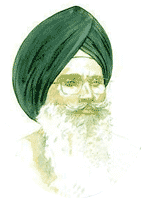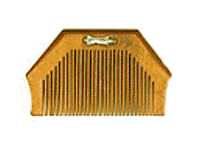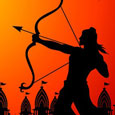|
The Five K's (Kakkar):
The five sacred Sikh symbols prescribed by Guru Gobind Singh are commonly known as Panj Kakkar or the 'Five Ks' because they start with letter K representing Kakkar in the Punjabi language. They are:

1. Kes or unshorn hair, regarded as a symbol of saintliness. Guru Nanak started the practice of keeping the hair unshorn. The keeping of hair in its natural state is regarded as living in harmony with the will of God, and is a symbol of the Khalsa brotherhood and the Sikh faith. Hair is an integral part of the human body created by God and Sikhism call for its preservation. The shaving or cutting of hair is one of the four taboos or Kurehats.

2. Kangha or the comb is necessary to keep the hair clean and tidy. A Sikh must comb his hair twice a day and tie his turban neatly. The Gurus wore turbans and commanded the Sikhs to wear turbans for the protection of the hair, and promotion of social identity and cohesion. It has thus become an essential part of the Sikh dress.
 3. Kara or the steel bracelet symbolizes restrain from evil deeds. It is worn on the right wrist and reminds the Sikh of the vows taken by him, that is, he is a servant of the Guru and should not do anything which may bring shame or disgrace. When he looks at the Kara, he is made to think twice before doing anything evil with his hands. 3. Kara or the steel bracelet symbolizes restrain from evil deeds. It is worn on the right wrist and reminds the Sikh of the vows taken by him, that is, he is a servant of the Guru and should not do anything which may bring shame or disgrace. When he looks at the Kara, he is made to think twice before doing anything evil with his hands.

4. Kachh or the soldiers shorts must be worn at all times. It reminds the Sikh of the need for self-restrain over passions and desires. Apart from its moral significance, it ensures briskness during action and freedom of movement at all times. It is a smart dress as compared to the loose dhoti which most Indian wore at that time.

5. Kirpan or the sword is the emblem of courage and self-defense. It symbolizes dignity and self-reliance, the capacity and readiness to always defend the weak and the oppressed. It helps sustain one's martial spirit and the determination to sacrifice oneself in order to defend truth, oppression and Sikh moral values.
The Five K's, along with the turban, constitute the Khalsa uniform, which distinguishes a Sikh from any other person in the world, and is essential for preserving the life of the community and fostering the Khalsa brotherhood.
The Five K's are not supposed to foster exclusiveness or superiority. They are meant to keep the Sikhs united in the pursuit of the aims and ideals of the Gurus. They enable them to keep their vows made at the time of baptism. The Sikhs have been known to face torture and death rather than cut their hair or remove any of the sacred symbols.
The Khalsa cannot be anonymous. His religion is known to all. He stands out among people, and any unseemly behavior or action on his part would be noted as unbecoming of a follower of the Gurus. People would easily blame him if he deviated from the disciplinary code of Guru Gobind Singh.
Along with the maintenance of the Five K's, the Khalsa is required to refrain from committing the four taboos or Kurehats. These are:
1. Trimming, shaving or removing hair from the body.
2. Using tobacco or intoxicants in any form.
3. Eating of meat.
4. Committing adultery.
A Sikh guilty of committing any of these serious breaches is regarded as the fallen one (Patit or Tankhahiya). Guru Gobind Singh declared that as long as the Khalsa followed the Five K's and Sikh code of discipline, he would win glory, but if he showed indifference, his progress would be hampered.
Click here for some other
Sikh Symbols
Quotes| Guru Nanak Jayanti Celebrations
|



 3. Kara or the steel bracelet symbolizes restrain from evil deeds. It is worn on the right wrist and reminds the Sikh of the vows taken by him, that is, he is a servant of the Guru and should not do anything which may bring shame or disgrace. When he looks at the Kara, he is made to think twice before doing anything evil with his hands.
3. Kara or the steel bracelet symbolizes restrain from evil deeds. It is worn on the right wrist and reminds the Sikh of the vows taken by him, that is, he is a servant of the Guru and should not do anything which may bring shame or disgrace. When he looks at the Kara, he is made to think twice before doing anything evil with his hands.


 Ram Navami
Ram Navami Passover
Passover Good Morning
Good Morning